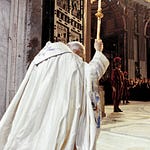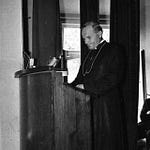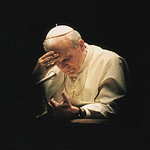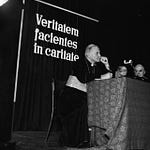In the depths of his conscience, man detects a law which he does not impose upon himself, but which holds him to obedience. Always summoning him to love good and avoid evil, the voice of conscience when necessary speaks to his heart: do this, shun that. For man has in his heart a law written by God; to obey it is the very dignity of man; according to it he will be judged. Conscience is the most secret core and sanctuary of a man. There he is alone with God, Whose voice echoes in his depths. In a wonderful manner conscience reveals that law which is fulfilled by love of God and neighbor.[1]
So teaches the Second Vatican Council in it Pastoral Constitution on the Church in the Modern World — Gaudium et Spes. This full-throated affirmation of the place and role of conscience is an oft-noted achievement of Vatican II. Unfortunately, in the wake of the Council and especially in with the publication of Humanae Vitae, the proper understanding of conscience has been almost lost as innovative theories of ‘creative’ conscience have created confusion in broad sectors of the Church. Based on a flawed theory of conscience, many theologians and even ministers in the Church have provided ‘loopholes’ for the faithful to excuse themselves from obeying natural and Divine law.
In Veritatis Splendor Pope Saint John Paul II defines conscience.
[C]onscience is the application of the law to a particular case; this application of the law thus becomes an inner dictate for the individual, a summons to do what is good in this particular situation. (Sec 59)
What this means is the conscience is not a person’s decision about right and wrong, but rather the application of a truth to his own action. Thus, it involves an intellectual recognition of a truth about some good. Having recognized that stealing is against God’s law (in this case the Seventh Commandment) conscience is not free to decide that in this case stealing is okay. Neither can conscience be identified simply with one’s own strongly held opinion. Conscience is guided by truth.
[1] Gaudium et Spes, §16.










